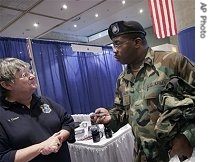2006年VOA标准英语-US Military Veterans Battle for Jobs at Home(在线收听)
By Amanda Cassandra
New York
19 November 2006
 James Johnson, a 22-year Army veteran, talks with Pat Cooke, left, a recruiter for the Clearwater, Fla. police department, at a veterans job fair in New York |
||
----
Twenty-four year old Lee French is a veteran without a job. French received a baccalaureate degree in history from Carnegie Mellon University and spent a year in Kuwait, serving as a shipping supervisor.
French said when he returned to the United States, he struggled to locate career opportunities that put his military experience to use. "I interviewed with a shipping company and they saw my resume online and they e-mailed me and they asked me to come in and once I showed up, I guess the guy was surprised that I was so young. He told me he would call me back, but I haven't heard from him," he said.
For many U.S. military veterans, pursuing a job is a critical first step to returning to civilian life and for some, it is not an easy one.
These veterans are not without help.
The New York Times Company is sponsoring annual job fairs called "Salute Our Heroes" to help veterans make the transition from military to civilian jobs.
Hundreds of military veterans attended the career fair, which provides access to leading companies, to resume writing services and seminars.
At a recent job fair in New York, Astronaut Dan Burbank, of the National Aeronautics and Space Administration, said veterans have a multitude of skills to offer employers.
"The thing that these veterans are bringing to the work force right now, whether it be NASA or whether it be in the private sector, (is) the ability to work with technology and work with and work with it well. NASA, historically to this day and always has dealt with technology that is right up at the edge of what engineering can do and again these people have dealt with that and worked with it on a regular basis. But I think a more broad application for them is just the sense of team work, the discipline, the competence, the professional competence that these individuals have because of the experiences that they've had," he said.
New York Times chief legal officer Solomon Watson said veterans deserve more than a pat on the back and a thank you for their service. Solomon, himself a former U.S. military veteran, says veterans need to know they have support. "The first thing I'd like them to take away from the job fair is not at all job related, it's citizen related in that all of the folks here, the New York Times, the veterans organizations, the employers celebrate and honor our veterans for their service. Secondly, we want them to take away that there's a commitment here from all of these organizations, individuals and agencies to help them get back into the work force and become contributing members of society," he said.
Michael John Ortiz is a veteran job seeker who served as a lieutenant and army transporter in Iraq for 10 months. He says he returned to the United States to find his job situation different from when he left. "I go back to work in January 2006, one, to find out that I was given a job but I wasn't the same status. And two, to find out that the job was ending because it was a granted funded program and that grant was unfortunately defunded and I'm good there until 5pm November 30th. That's it. Our program is totally gone so coming to this job fair is not just me wanting to do it, it's a necessity at this point," he said.
Ortiz is confident in his skills and those of his fellow veterans. "I think anyone who can lead soldiers while under fire and get those soldiers back home, I think that's someone worth talking to as far as employment goes so that's how I'm trying to market myself. I went from working in an office to overseas working in a combat zone back to an office. And I don't mind the academic world, the administrative portion of it, but I know now I can handle a great deal more than just that. If these employers here are looking for veterans specifically, I'm going to take advantage of that," he said.
The New York job fair is only one example of many efforts to find jobs for veterans. There are over 3,500 government run employment offices in the United States that give priority to veterans for job training and placement.
Veterans can also utilize the resources available by law through the so-called G.I. Bill, which guarantees up to 36 months of education benefits to eligible veterans for college or vocational education as well as one year of unemployment compensation.